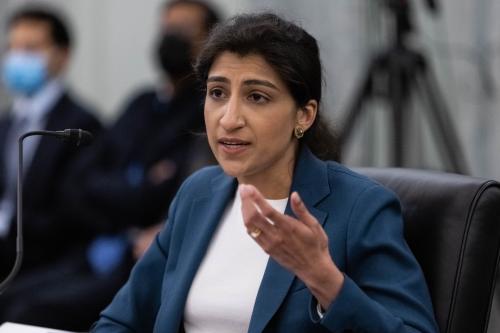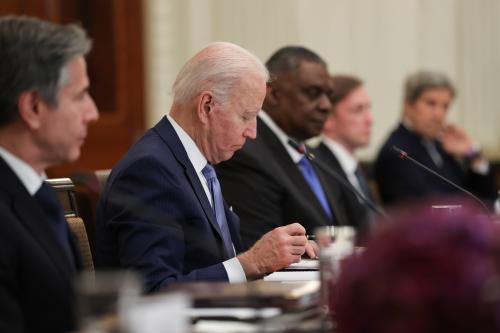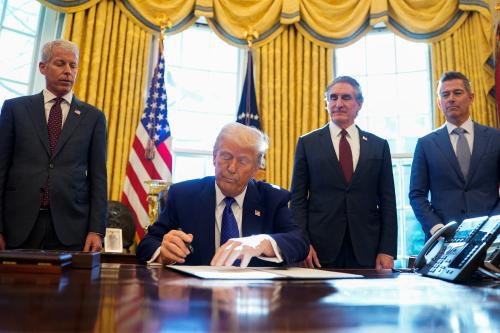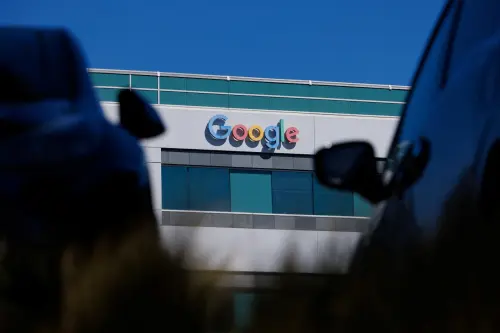This article was originally published in Lawfare.
How does a hundred-year-old agency shift its resources and focus to grapple effectively with Big Tech and some of the biggest policy puzzles of a generation? The Federal Trade Commission (FTC) has faced this challenge since the dotcom era. As it still scrambles to adjust, the FTC has received harsh criticism in recent years for its approvals of ballooning tech mergers and its seeming inability to deter or avert privacy scandal after privacy scandal. At the same time, popular interest in reining in Big Tech and protecting privacy has mounted. Perched at the intersection of these two issues is a wonky but fundamental problem for the agency: Do the FTC’s longstanding conflict-of-interest rules unnecessarily impede the agency’s ability to attract, retain, and deploy technical expertise that it badly needs?
A functional government requires ethics rules to prevent self-dealing and the accompanying erosion of public trust. But overly rigid ethics rules—or overbroad applications thereof—may shut people with relevant expertise out of the agencies that need them, given the unnecessary constraints they place on the future work of talented experts with an array of career choices. Ethics rules must strike a careful balance between the competing objectives of preventing corruption (and the appearance thereof) and enabling the cultivation of agency expertise.
As we explain in a new essay just published in the Berkeley Technology Law Journal, the FTC’s conflict-of-interest rules for former employees are no longer striking this balance. The existing rules, crafted in a bygone era, now have the counterproductive effects of causing technical experts to avoid working on key investigations at the agency while simultaneously preventing those who previously worked there from engaging in critical work overseeing Big Tech, such as consulting with state attorneys general. Two of us speak from direct experience—one as a former Chief Technologist and the other as a former Senior Policy Advisor for privacy at the FTC—and we also interviewed other former FTC officials as we wrote the journal article.
FTC ethics rules impose a bunch of obligations upon current and former agency employees. After leaving the agency, a former FTC employee is generally barred from working on the “same proceeding or investigation” as one in which they “participated” during their employment. This serves the important goal of preventing former civil servants from taking insider knowledge of the agency and switching sides, going to work for the very parties that they previously were investigating and regulating. Without attract a job offer from the target of an investigation, which would call into serious question enforcement choices made by the employee made while still at the agency. We strongly support the need to enforce ethics rules to prevent situations like these and to slow or halt the revolving door from government to industry. Unfortunately, however, the FTC’s rules currently also prevent former employees from working for other organizations with similar goals to the FTC. The FTC interprets its own rules so broadly as to prohibit former employees from working on most state investigations of competition and consumer protection violations relating to many of the large tech companies.
A number of factors contribute to the broad reach of these post-employment conflict-of-interest rules in the tech context. For one thing, because the FTC has so few technologists—at one point, as few as one—to be deemed to have “participated” in it for the purpose of delineating future ethics restrictions. In addition, immense consolidation in the tech sector means that when it comes to looking at some of the worst tech practices, a handful of companies (think Facebook, Google, and Amazon) are bound to be implicated again and again—and likely to be under investigation by the FTC for something or other at virtually any point at time. And when the FTC settles its cases against tech companies, it tends to settle them with long-lasting consent decrees, technically extending the life of a “proceeding or investigation” for twenty years past the point when the initial investigation concludes. Finally, the FTC tends to treat follow-on investigations of a company as the same proceeding or investigation, even when the underlying conduct is completely unrelated and involves technology or practices not even contemplated at the time of the original settlement.
The result is that once FTC technologists leave the agency, they may find it difficult or impossible to do future work on any privacy investigation of Google or any competition investigation of Facebook for . This severely limits the ability of the very small population of civic-minded techies to assist with other investigations of wrongdoing that have no meaningful connection to FTC investigations conducted 5 or 10 years ago. Even investigations into products or services that did not yet exist at the time might be construed as the “same proceeding or investigation” under the agency’s rules.
These dynamics have concerning implications for consumer protection and antitrust enforcement. Former FTC technologists find themselves unable to contribute to the investigations and enforcement efforts of other agencies and plaintiffs’ attorneys aligned with the mission of the FTC, which severely hamper those efforts. The problem is so bad that some current FTC technologists are unwilling to work on important issues before the agency for fear that their participation now might limit what they can work on for nearly the rest of their careers. And would-be technologists may avoid working for the agency due to these concerns—compounding the existing difficulty of attracting that expertise with a relatively modest government salary. The status quo is not serving the public interest.
Fortunately, these problems can be fixed with some simple modifications to the ethics rules, which the FTC has the authority to quickly adopt on its own. We recommend that the agency narrow the definition of a “same proceeding or investigation,” and consider a bright-line time limit on investigations that will be considered the same. It should also distinguish post-employment matters with state attorneys general or plaintiffs’ attorneys from employment that actually threatens the anti-corruption objectives of the rules, such as leaving the agency to go work for Google or Facebook. And it should clarify the substance and procedure of the clearance process, which is currently opaque and inconsistent. While the FTC works to revise its rules, it can also start granting more clearance requests for tech experts seeking to work on cases litigated by state attorneys general and plaintiffs’ attorneys. Parallel reforms, such as a modest raise to the pay scale for technologists, could further improve the FTC’s ability to draw and retain expertise.
Anti-corruption restrictions on former government workers’ employment are necessary and important. But the FTC’s approach to its rules for former technologists seeking only to work for another part of the team, so to speak, rather than switch sides, undermines the agency’s effectiveness without slowing the revolving door. The Biden FTC seems eager to utilize any and all available tools to make the agency a more effective protector of consumers and well-functioning markets. Making it easier for the agency to use, attract, and retain technological expertise would be a great place to start.
Facebook, Google, and Amazon are general, unrestricted donors to the Brookings Institution. The findings, interpretations, and conclusions posted in this piece are solely those of the authors and not influenced by any donation.
The Brookings Institution is committed to quality, independence, and impact.
We are supported by a diverse array of funders. In line with our values and policies, each Brookings publication represents the sole views of its author(s).











Commentary
Outdated ethics rules may be stymieing the Federal Trade Commission’s efforts to keep up with big tech
July 29, 2021